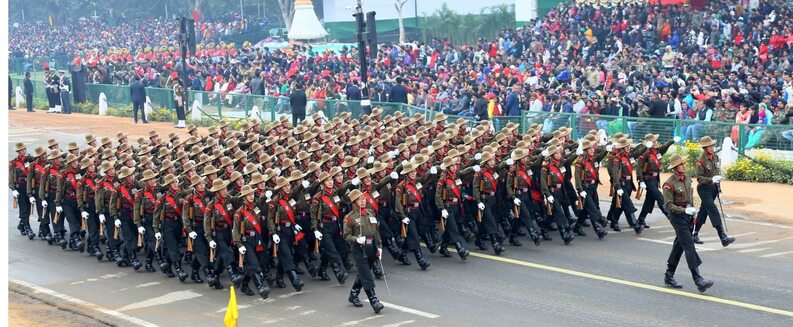

The Gorkha Regiment at the Republic Day parade
<p>
As a playwright and director, the Padma Shri awardee Chiranjit went beyond the usual entertainment quotient. This is evident in his Hindi play <em>Ooncha Parvat, Oonche Log</em>, recently uploaded on Youtube by Air India Radio&rsquo;s Central Drama Unit after refurbishing.</p>
<p>
Produced in the 70s, this two-part play is very contextual, effectively depicting the historical, cultural, social and economic ties shared by India and Nepal. Given the tumultuous relations between the two countries in recent past, the play is an appropriate medium, to stress, strengthen and further these ties.</p>
<p>
The multi-layered drama, is a perfect example docu-drama. Messaging is well dovetailed with the content.</p>
<p>
Writer Chiranjit, aptly highlights how Nepalis, Gorkhas and Sherpas, settled in India, Darjeeling in particular, and contributed immensely in all spheres of life, be it music, songs, art, economy, security, etc. For example, we are informed of their active participation in the Indian freedom movement, and how they continue guard the Indian frontiers as part of the Army after independence.</p>
<p>
<img alt="" src="https://www.indianarrative.com/upload/news/Chiranjit3.jpg" style="width: 350px; height: 518px;" /></p>
<p>
Commonalities are brought to fore through Dussehra and Deepavali festivals, which are fervently celebrated in both the regions.</p>
<p>
With the Prime Minister urging collaboration and cooperation among the countries of subcontinent, plays like this will go a long way to bring people closer!</p>
<p>
Two stories from different timeline are run parallelly in the play. We become aware of a mother, searching her heart-broken son, Ashok, while flashback tells about the daughter of a poor tea estate worker, Kammo, who loves Bahadur, a chowkidar, and his mellifluous flute music. Moving effortlessly, back and forth from past to present, one finds that Ashok, who loved his best friend Anwar&rsquo;s sister Salima, becomes distraught, when she commits suicide on her marriage being fixed with someone else. The two tales converge in the end springs a surprise for the audience.</p>
<p>
While seamlessly tying the past and present, Chiranjit suffuses the play with vivid description of Darjeeling&rsquo;s history, its scenic Kanchenjunga mountain, waterfalls and sunrise and sunset, its people, the Nepalis settled there, the Himalayan Mountaineering Institute, etc.</p>
<p>
Om Shivpuri, the veteran actor, as Ghoshal Da, in his perfect intonation, makes us familiar with all this.</p>
<p>
Information nuggets are interspersed in the play. For example, we are told Darjeeling comes from the Tibetan words dorje and ling, meaning thunderbolt sceptre of God Indra and place, respectively. And that the British established a sanatorium and military depot in Darleejing, followed by extensive tea plantations.</p>
<p>
Or that the Himalayan Mountaineering Institute established in Darjeeling in 1954, boasts of Tenzing Norgay, the first to climb Mt. Everest in 1953 with Sir Edmund Hillary, as its first field training director. The innovative inclusion of a brief voiceover by Tenzing stating that Prime Minister, Pandit Jawaharlal Nehru asked him to train several Everest climbers, makes it refreshing.</p>
<p>
Without any conscious attempt, Chiranjit brings in the issue unity in diversity in the Indian society. So we have characters like Rosamma from South and Anwar from North, cutting across the religious and regional divide. Likewise, economic disparity is conveyed and gender discrimination, too are dealt with.</p>
<p>
Chiranjit achieves, all this without compromising the aesthetic appeal of the play. Without being preachy it resonates well with the audience!</p>
<p>
From presentation aspect, Chiranjit scores full marks. Under his baton, theatre artists like Veena Hora (Kammo and Maa Ji); Om Shivpuri; Dina Nath Zutshi (Kammo&rsquo;s father)i; Sudhir Ahuja (Anwar); Anil Sehgal (Ashok) and others, deliver excellent performance through voice and pitch modulation and perfect pauses. Grief, joy, bliss and sadness, all are well emoted. The director&rsquo;s use of sound is remarkable. For example, repeated pounding sound, effectively conveys, Ashok banging his head against the wall on hearing of Salima&rsquo;s death.</p>
<p>
Chiranjit, born in 1919, was an acclaimed theatreperson, poet, lyricist, author and journalist, whose creative efforts always reflected his patriotism. He died in 2007.</p>
External Affairs Ministry Spokesperson Randhir Jaiswal on Thursday has reiterated India's stance on bilateral discussions…
India implemented a new visa module for Afghan nationals on April 29, Ministry of External…
India is in touch with Iranian authorities for locating three Indian nationals who went missing…
A citywide closure occurred throughout the Awaran district in Balochistan on Wednesday, with shops, businesses,…
The Czech Republic's government has officially linked a malicious cyberattack on its Ministry of Foreign…
Chief of Defence Staff General Anil Chauhan will visit Singapore from May 30 to June…